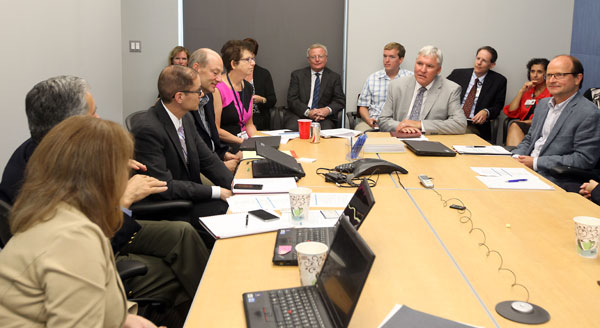BMS Partners with Medical University

Complete the form below to unlock access to ALL audio articles.
The agreement includes studies designed to improve the mechanistic understanding of fibrosis, explore patient segmentation based on disease characteristics and/or biomarker approaches and predictors of disease progression.
Cole congratulated the work group on its efforts and stressed the importance of collaboration.
“The quicker we’re able to develop meaningful relationships, success will inform success. I don’t see that in the future, MUSC is going to stand alone. We have a lot of strengths, but we have to partner strategically to be able to leverage each other’s capability.”

Carl Decicco, Ph.D., head of discovery for research and development with Bristol-Myers Squibb, said the collaboration with MUSC strengthens and advances the company’s discovery research efforts in fibrotic diseases, which is a strategic area of focus for the company.
“MUSC brings substantial expertise in translational research and drug discovery related to fibrotic diseases, including access to patient derived disease tissue samples, that will help us accelerate the application of scientific knowledge to potential new treatment approaches for patients.”
It was cause for celebration for Karen Lackey, MUSC Center for Therapeutic Discovery and Development executive director and pharmacy associate professor, who has been instrumental in spearheading the collaborative effort.
“This is an exciting opportunity with the potential to make a significant impact in fibrotic diseases and in patients’ lives with these debilitating diseases,” Lackey said. “Our goal with translational research is to shorten the timeline in getting patients the medications and treatments they need. We have unparalleled expertise in fibrosis research at MUSC, and this collaboration with a leader like Bristol-Myers Squibb in discovery and development of medications is going to take that foundational work to the next level.”
Leaders of Bristol-Myers Squibb and MUSC say they are committed to addressing the unmet need in fibrotic diseases that are characterized by the formation of excess fibrous connective tissue in an organ or tissue, by identifying novel medicines to halt or slow disease progression. Among the assets in Bristol-Myers Squibb’s fibrosis portfolio are BMS-986020, a lysophosphatidic acid 1 (LPA1) receptor antagonist in Phase 2 development for the treatment of idiopathic pulmonary fibrosis (IPF), and a CCR2/5 dual antagonist in Phase 2 development for diabetic kidney disease.
In addition, in November 2014, Bristol-Myers Squibb and Galecto Biotech AB announced an agreement that provides Bristol-Myers Squibb the exclusive option to acquire Galecto Biotech AB and gain worldwide rights to its lead asset TD139, a novel inhaled inhibitor of galectin-3 in Phase 1 development for the treatment of IPF and other pulmonary fibrotic conditions. Bristol-Myers Squibb and the California Institute for Biomedical Research also announced a worldwide research collaboration in January 2015 to develop novel small molecule anti-fibrotic therapies, and an exclusive license agreement that allows Bristol-Myers Squibb to develop, manufacture and commercialize Calibr’s preclinical compounds resulting from the collaboration.

